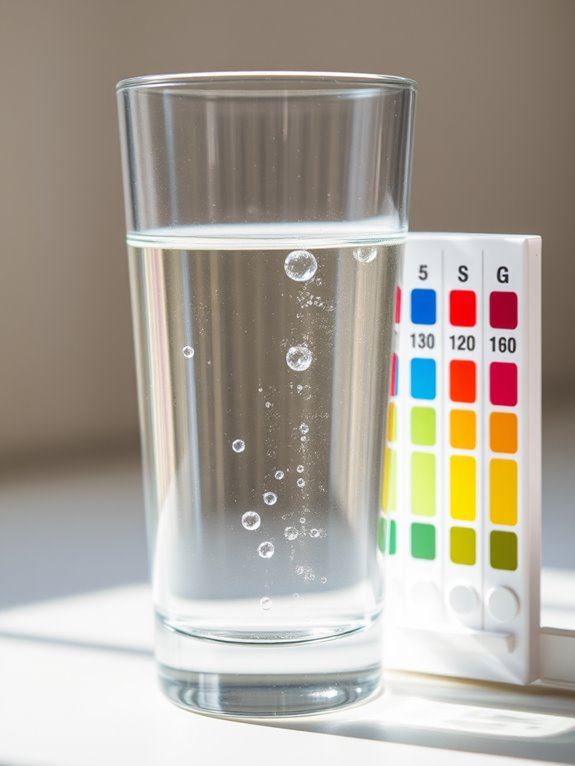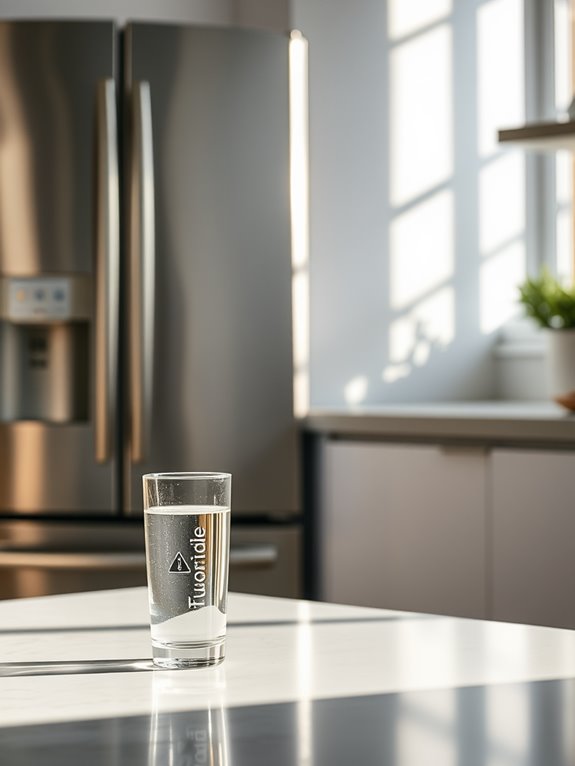Refrigerator water filters often don’t effectively remove fluoride, which is essential for your dental health. While activated carbon filters primarily enhance flavor, they struggle with fluoride. If you want to reduce fluoride levels, a reverse osmosis system is your best bet. Some ion exchange filters can help, but their performance varies. Understanding your options will help you make the best choice for clean water. Explore more about filter types and their capabilities to guarantee safe drinking water.
Understanding Fluoride and Its Sources

Although fluoride is often recognized for its dental benefits, understanding its sources is essential for making informed choices about your water consumption.
You’ll find fluoride naturally in certain water sources, like rivers and lakes, but it’s also added to public water supplies to prevent tooth decay.
Processed foods, beverages, and dental products can contribute to your fluoride intake as well.
Be aware that not all water filters remove fluoride effectively, which could impact your overall exposure.
Knowing where fluoride comes from helps you assess its presence in your diet and make decisions that align with your health preferences.
How Do Refrigerator Water Filters Work?
Refrigerator water filters use various mechanisms to purify your drinking water, ensuring it’s safe and tasty.
You’ll find different types of filters available, each with its own unique benefits.
Regular maintenance and timely replacement are essential to keep your filter working effectively and to enjoy clean water.
Filtration Mechanisms Explained
When you turn on your refrigerator’s water dispenser, a sophisticated filtration system kicks into gear to guarantee you get clean, great-tasting water.
This system typically employs several mechanisms to filter impurities effectively:
- Activated Carbon: Adsorbs chlorine, odors, and organic compounds.
- Sediment Filtration: Removes dirt, rust, and larger particles.
- Ion Exchange: Reduces heavy metals like lead and copper.
- Microfiltration: Removes bacteria and cysts.
- Reverse Osmosis: (if included) further purifies by pushing water through a semipermeable membrane.
These processes work together, ensuring you enjoy fresh water straight from your fridge.
Types of Filters
Understanding the types of filters used in your refrigerator can help you appreciate how they keep your water clean and safe to drink.
Most refrigerators use activated carbon filters, which effectively remove chlorine, sediment, and some contaminants through adsorption.
Some models may also incorporate reverse osmosis systems for enhanced purification, targeting even smaller particles.
Another option is a multi-stage filter, combining different filtration methods to tackle various impurities.
Maintenance and Replacement
To keep your refrigerator’s water filter working effectively, regular maintenance and timely replacement are key.
Here’s what you need to do:
- Check the filter indicator light; replace it when it signals.
- Change your filter every six months for peak performance.
- Clean the water dispenser regularly to prevent buildup.
- Flush the system after installing a new filter to remove any contaminants.
- Store replacement filters in a cool, dry place to maintain their integrity.
You might also be interested in: Are All Water Filters the Same? Understanding the Key Differences
Types of Water Filters Used in Refrigerators

While you mightn’t think about it often, the type of water filter in your refrigerator plays an essential role in ensuring you have clean and great-tasting water.
Most refrigerators use either activated carbon filters or reverse osmosis systems. Activated carbon filters effectively reduce chlorine, sediment, and some contaminants, enhancing flavor.
On the other hand, reverse osmosis systems provide a more thorough purification process, removing a broader range of impurities. Some refrigerators combine these technologies for ideal results.
Understanding these types helps you choose the right filter for your needs, leading to healthier hydration and improved taste in every glass.
There’s more to explore! Here’s another valuable read: Are Water Filter Cartridges Interchangeable? Here’s What You Should Know
Fluoride Removal Capabilities of Different Filters
When choosing a refrigerator water filter, it’s essential to understand how well different types can remove fluoride.
Some filters, like reverse osmosis systems, excel at reducing fluoride levels, while others may not be as effective.
Let’s explore the various filter types and their effectiveness against fluoride contamination.
Filter Types Explained
Understanding the various types of refrigerator water filters can help you choose one that effectively addresses fluoride removal.
Here are some common filter types and their characteristics:
- Activated Carbon Filters: These primarily improve taste and odor but may not effectively remove fluoride.
- Reverse Osmosis Systems: Highly effective for fluoride removal, often used in combination with other filters.
- Ion Exchange Filters: Can reduce fluoride levels, but effectiveness varies.
- Ceramic Filters: Good for particulate removal, but not typically designed for fluoride.
- Distillation Filters: Remove fluoride by boiling water and collecting steam, but can be less convenient.
Choose wisely for cleaner water!
Effectiveness Against Fluoride
Not all refrigerator water filters are created equal, especially when it comes to removing fluoride. Some filters, like activated carbon models, mightn’t effectively reduce fluoride levels.
On the other hand, reverse osmosis systems and specific ion-exchange filters are more capable of tackling fluoride. If you’re concerned about fluoride in your drinking water, check the filter specifications before purchasing.
Look for certifications like NSF/ANSI 53, which indicates fluoride removal capabilities. Remember, investing in the right filter can greatly impact your water quality and overall health.
Make sure you choose wisely to protect yourself and your family.
Don’t miss out on related tips: Read this next: Are Water Filter Cartridges Recyclable? A Guide to Sustainable Choices
Testing Your Water for Fluoride Levels

How do you know if your water contains fluoride? Testing your water is the best way to find out.
You can easily check fluoride levels using various methods. Here’s what you can do:
- Purchase a home test kit online or at a local store.
- Send a sample to a certified lab for accurate results.
- Contact your local water utility for fluoride information.
- Use a digital meter designed for measuring fluoride levels.
- Look for state or federal health department resources on water quality.
Here’s another post you might find useful: Best Hard Water Shower Filters: Protect Your Skin and Hair
Alternative Methods for Fluoride Removal
If you’re looking to reduce fluoride in your water, several effective methods can help.
One popular option is a reverse osmosis system, which effectively removes fluoride along with other contaminants.
Activated alumina filters are another choice, specifically designed to target fluoride.
Distillation is also effective; by boiling water and capturing the steam, you leave most contaminants behind.
Additionally, you might consider using a water pitcher filter that claims to reduce fluoride, but check the specifications to verify effectiveness.
Each method varies in cost and maintenance, so choose the one that fits your needs and lifestyle best.
You might also be interested in: Everything You Need to Know About the Amway Espring Water Filter
Health Implications of Fluoride in Drinking Water

While many believe fluoride in drinking water helps prevent tooth decay, concerns about its health implications have sparked debate. You might wonder what the potential risks are.
Here are some key points to evaluate:
- Possible dental fluorosis, leading to discoloration of teeth
- Potential links to thyroid issues
- Concerns about bone strength and fractures
- Possible developmental effects on children
- Ongoing debates about its impact on overall health
Understanding these implications can help you make informed choices about your drinking water and its effects on your health.
Stay aware and assess all factors when evaluating your water source!
Here’s another post you might find useful: Are Water Treatment Plants Considered Industrial? Key Facts to Know
Choosing the Right Water Filter for Your Needs
When choosing the right water filter for your needs, what factors should you consider? Start by identifying your water quality and specific contaminants you want to remove, like fluoride.
Next, think about the filter type—activated carbon, reverse osmosis, or distillation—since each has its strengths.
Assess the filter’s capacity and how often you’ll need replacements to avoid surprises.
Also, consider the filter’s installation process; some require professional help while others are DIY-friendly.
Finally, budget matters, so find a filter that balances effectiveness and cost.
Maintenance and Replacement of Refrigerator Water Filters

Regular maintenance and timely replacement of your refrigerator water filter are essential for ensuring clean, safe drinking water.
To keep your water filter functioning properly, follow these tips:
- Replace the filter every 6 months or as recommended.
- Flush the new filter by running water for a few minutes.
- Keep a calendar reminder for replacements.
- Check for leaks or unusual sounds during operation.
- Clean the water dispenser regularly to prevent buildup.
Conclusion
To summarize, understanding your water filter’s capabilities, testing your water for fluoride, and exploring alternative removal methods are essential steps for ensuring clean drinking water. Whether you choose a high-performance filter, consider reverse osmosis, or rely on activated alumina, you deserve safe, fluoride-free hydration. By prioritizing your health and making informed choices, you can enjoy peace of mind, protect your family, and enhance your water quality. So, take action and secure your water today!

I’m Allen Kim, the chief editor of plumbinginto. I am a mid level plumber and assign to an local firm over 4 years of experience. During the working period, most of my experience is related to the house plumbing. I learned about the thing, when working with most experienced people in this sector, one must be as good as the inspector or better with knowledge of the project as well as the practical aspects of plumbing industry.